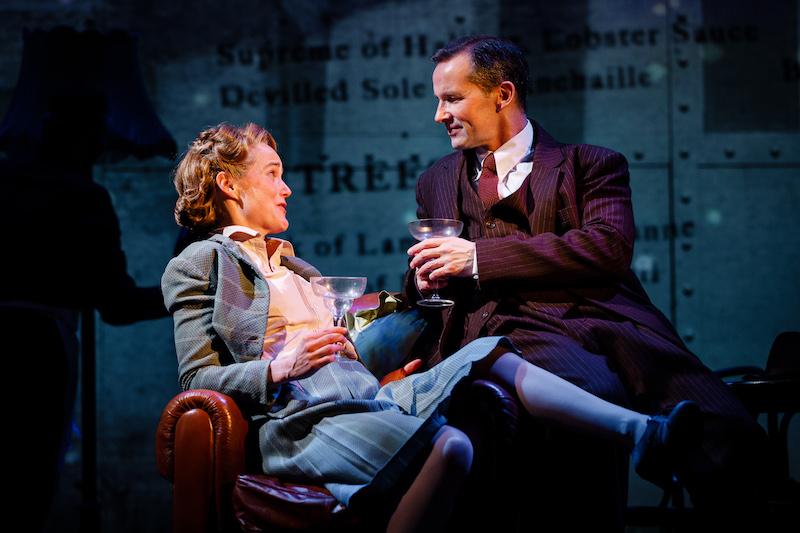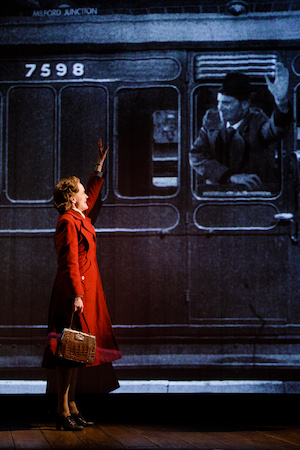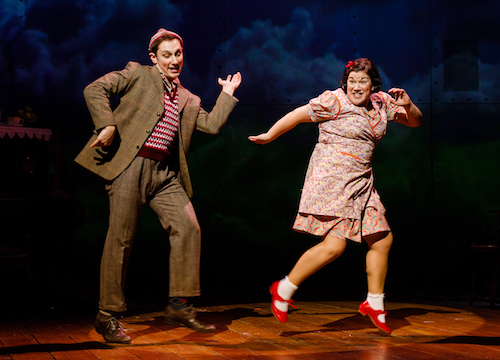Brief Encounter, Empire Cinema review – poignant, hilarious revival | reviews, news & interviews
Brief Encounter, Empire Cinema review – poignant, hilarious revival
Brief Encounter, Empire Cinema review – poignant, hilarious revival
Emma Rice's lauded stage version of the film returns with charm and inventiveness intact

It would be so easy to make fun of the 1945 Noel Coward/ David Lean film in which, famously, nothing happens between two guilt-ridden married lovers. That oh-so-British middle class restraint, those flet, perfectly enunciated vowels, the overwhelming romantic rush of Rachmaninov’s Piano Concerto No 2 – isn’t it all a bit OTT, just crying out for a French-and-Saunders-style send-up?
Rice knows, of course, that the lack of physical action does not mean that nothing happens; these two nice, otherwise ordinary, people experience a love all the more profound because it is forbidden and neither will ever be the same again. Coward, who adapted his own play, Still Life, for the screen (and many of whose lines occur in the dialogue here) was no doubt expressing something of his own frustration at being unable, as a gay man in post-war England, to follow his desires openly.
 Rice avoids the opposite temptation to satire – tedious reverence for a classic – by surrounding the couple with a circus of comic characters, based on less developed prototypes in the film, several of whom have no trouble at all in expressing their carnal desires. All these are denizens of the station, here suggested by a gantry, piles of coal and with brass bells rung to indicate the imminent departure of a train. All this with music of the period, songs by Coward, clever choreography and some snippets of specially shot black-and-white footage which Laura or Alec occasionally appears to enter from the stage. The result is a satisfying mixture of the original and something entirely new, a joyfully theatrical homage to cinema.
Rice avoids the opposite temptation to satire – tedious reverence for a classic – by surrounding the couple with a circus of comic characters, based on less developed prototypes in the film, several of whom have no trouble at all in expressing their carnal desires. All these are denizens of the station, here suggested by a gantry, piles of coal and with brass bells rung to indicate the imminent departure of a train. All this with music of the period, songs by Coward, clever choreography and some snippets of specially shot black-and-white footage which Laura or Alec occasionally appears to enter from the stage. The result is a satisfying mixture of the original and something entirely new, a joyfully theatrical homage to cinema.
Isabel Pollen and Jim Sturgeon as the lovers scrupulously avoid any hints at nudge-nudge knowingness; their ecstasy and pain are perfectly convincing, even when passion is expressed by a crashing wave on the screen behind them. Everyone else moves swiftly and effectively in and out of two or three parts, including torch-wielding, close-harmony-singing ushers in buttoned uniforms. There must be a mini quick-change industry going on in the wings.
Dean Nolan as the workaday husband Fred does not attempt Cyril Raymond’s subtlety in the final scene. Where Raymond hints at unexpected depths of sympathy and understanding, Nolan simply sounds a little cross with “Thank you for coming back to me”. Nolan is also, however, the disapproving friend whose flat Alec nearly turns into a love nest, and the surprisingly acrobatic and very funny suitor to the station tea bar manager Myrtle. As “posh”-twanged (but up for it) Myrtle and her rosy-cheeked, giggling assistant Beryl, Lucy Thackeray and Beverly Rudd have a ball, singing, dancing and morphing into the snooty acquaintances who catch Laura and Alec sharing champagne. Whereas Celia Johnson’s Laura suffers paroxysms of guilt and social embarrassment, the scene here is more about Hermione and Mary Norton - each with a tiny, apparently supercilious, dog on a leash - raising gales of laughter. It is a worthwhile exchange.
As Beryl’s beau Stanley, Jos Slovick (below with Beverly Rudd as Beryl) has a sweet singing voice. Then he becomes a roughneck soldier, demanding out-of-hours brandy in the only scene which is tougher than its film equivalent. The war was over when the film was released, but it is set in 1938 and Rice, who directs with brio, allows a threatening note to enter here. Love changes people, but so does war. Laura’s anguish in weighing her irresistible feelings for the charming doctor who removes grit from her eye against duty to a reliable husband, marriage vows, children and respectability, is expressed exquisitely in the film by Johnson. The suffering in her eyes as, in voice-over, she mentally concocts a confessional letter to her husband – a letter she will never write – is unforgettable. This being a Kneehigh production, theatrical means are celebrated instead, with Laura’s feelings expressed in music and screen projections, especially of the sea, and she and Alec at one point literally swinging from chandeliers.
Laura’s anguish in weighing her irresistible feelings for the charming doctor who removes grit from her eye against duty to a reliable husband, marriage vows, children and respectability, is expressed exquisitely in the film by Johnson. The suffering in her eyes as, in voice-over, she mentally concocts a confessional letter to her husband – a letter she will never write – is unforgettable. This being a Kneehigh production, theatrical means are celebrated instead, with Laura’s feelings expressed in music and screen projections, especially of the sea, and she and Alec at one point literally swinging from chandeliers.
While it is a pleasure to hear so many Coward songs beautifully sung, Rachmaninov isn’t forgotten. A piano is present throughout, standing in for the counter, and then, at last, opened by Laura to play with all the pent-up passion of love denied.
- Brief Encounter at Empire Cinema, Haymarket until 2 September
- Read more theatre reviews on theartsdesk
The future of Arts Journalism
You can stop theartsdesk.com closing!
We urgently need financing to survive. Our fundraising drive has thus far raised £49,000 but we need to reach £100,000 or we will be forced to close. Please contribute here: https://gofund.me/c3f6033d
And if you can forward this information to anyone who might assist, we’d be grateful.

Subscribe to theartsdesk.com
Thank you for continuing to read our work on theartsdesk.com. For unlimited access to every article in its entirety, including our archive of more than 15,000 pieces, we're asking for £5 per month or £40 per year. We feel it's a very good deal, and hope you do too.
To take a subscription now simply click here.
And if you're looking for that extra gift for a friend or family member, why not treat them to a theartsdesk.com gift subscription?
more Theatre
 Wendy & Peter Pan, Barbican Theatre review - mixed bag of panto and comic play, turned up to 11
The RSC adaptation is aimed at children, though all will thrill to its spectacle
Wendy & Peter Pan, Barbican Theatre review - mixed bag of panto and comic play, turned up to 11
The RSC adaptation is aimed at children, though all will thrill to its spectacle
 Hedda, Orange Tree Theatre review - a monument reimagined, perhaps even improved
Scandinavian masterpiece transplanted into a London reeling from the ravages of war
Hedda, Orange Tree Theatre review - a monument reimagined, perhaps even improved
Scandinavian masterpiece transplanted into a London reeling from the ravages of war
 The Assembled Parties, Hampstead review - a rarity, a well-made play delivered straight
Witty but poignant tribute to the strength of family ties as all around disintegrates
The Assembled Parties, Hampstead review - a rarity, a well-made play delivered straight
Witty but poignant tribute to the strength of family ties as all around disintegrates
 Mary Page Marlowe, Old Vic review - a starry portrait of a splintered life
Tracy Letts's Off Broadway play makes a shimmeringly powerful London debut
Mary Page Marlowe, Old Vic review - a starry portrait of a splintered life
Tracy Letts's Off Broadway play makes a shimmeringly powerful London debut
 Little Brother, Soho Theatre review - light, bright but emotionally true
This Verity Bargate Award-winning dramedy is entertaining as well as thought provoking
Little Brother, Soho Theatre review - light, bright but emotionally true
This Verity Bargate Award-winning dramedy is entertaining as well as thought provoking
 The Unbelievers, Royal Court Theatre - grimly compelling, powerfully performed
Nick Payne's new play is amongst his best
The Unbelievers, Royal Court Theatre - grimly compelling, powerfully performed
Nick Payne's new play is amongst his best
 The Maids, Donmar Warehouse review - vibrant cast lost in a spectacular-looking fever dream
Kip Williams revises Genet, with little gained in the update except eye-popping visuals
The Maids, Donmar Warehouse review - vibrant cast lost in a spectacular-looking fever dream
Kip Williams revises Genet, with little gained in the update except eye-popping visuals
 Ragdoll, Jermyn Street Theatre review - compelling and emotionally truthful
Katherine Moar returns with a Patty Hearst-inspired follow up to her debut hit 'Farm Hall'
Ragdoll, Jermyn Street Theatre review - compelling and emotionally truthful
Katherine Moar returns with a Patty Hearst-inspired follow up to her debut hit 'Farm Hall'
 Troilus and Cressida, Globe Theatre review - a 'problem play' with added problems
Raucous and carnivalesque, but also ugly and incomprehensible
Troilus and Cressida, Globe Theatre review - a 'problem play' with added problems
Raucous and carnivalesque, but also ugly and incomprehensible
 Clarkston, Trafalgar Theatre review - two lads on a road to nowhere
Netflix star, Joe Locke, is the selling point of a production that needs one
Clarkston, Trafalgar Theatre review - two lads on a road to nowhere
Netflix star, Joe Locke, is the selling point of a production that needs one
 Ghost Stories, Peacock Theatre review - spirited staging but short on scares
Impressive spectacle saves an ageing show in an unsuitable venue
Ghost Stories, Peacock Theatre review - spirited staging but short on scares
Impressive spectacle saves an ageing show in an unsuitable venue
 Hamlet, National Theatre review - turning tragedy to comedy is no joke
Hiran Abeyeskera’s childlike prince falls flat in a mixed production
Hamlet, National Theatre review - turning tragedy to comedy is no joke
Hiran Abeyeskera’s childlike prince falls flat in a mixed production

Add comment